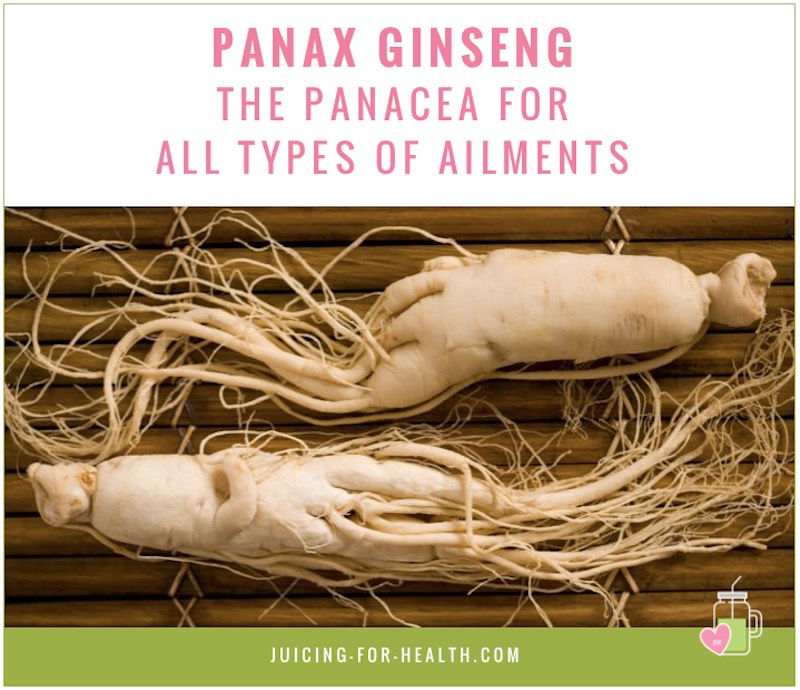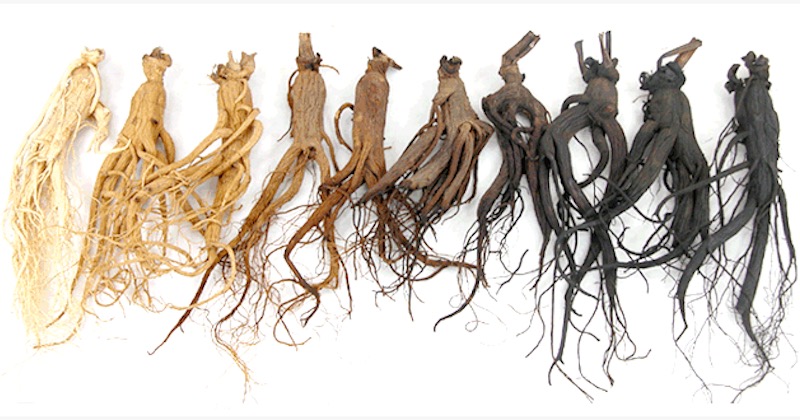Panax Ginseng: The Panacea For All Types Of Ailments
Last updated on
Panax ginseng is one of the most widely used plants for natural healing. No matter what disease or condition you think of, most likely ginseng has already been recommended for that throughout the last few thousand years.
Ginseng is an adaptogenic herb. An adaptogen is a unique group of herbal plants that “adapt” their function according to your body’s specific needs.

The scientific name of this genus, Panax, derives from the Greek word Panakos, meaning panacea. In ancient medicine, ginseng was considered the panacea, or a cure for all types of ailments.
In Chinese, ginseng (ren shen) literally means “human root” (named after its unique shape that sometimes resembles a human).
People who consumed the root regularly found that it improved their health to extraordinary levels and was effective for treating many diseases. The Chinese emperors often sent out their soldiers to forage for this treasured root for health and longevity.
Modern science has already found dozens of fabulous properties in the active compounds of ginseng—and there’s still a bunch of ongoing studies.
Maybe ginseng is really all-healing?
Common Ginseng Varieties
Botanically speaking, there are five main varieties of ginseng:
- Korean ginseng (Panax ginseng)
- American ginseng (Panax quinquefolius)
- South China ginseng (Panax notoginseng)
- Vietnamese ginseng (Panax vietnamensis)
- Japanese ginseng (Panax japonicus)
In terms of healing, however, they are more or less equally good. Korean ginseng is the most common one available both in supermarkets and supplement stores.
The main active compounds found in all types of ginseng are gintonin (a glycoprotein) and ginsenosides (a class of over 100 plant steroids and triterpenes), both pretty much exclusive to ginseng.
Now, depending on how ginseng is prepared, the level of some of these active compounds may either increase or decrease, defining the healing properties of the plant.

Fresh (Raw) Ginseng
This is the ginseng that’s usually sold in supermarkets as food. Delicious and incredibly versatile, it can be added to almost any dish or drink imaginable (just don’t overdo it, ginseng has a strong taste).
White Ginseng
White ginseng is fresh ginseng dried in the sun without any previous heating. Dried ginseng can be stored much longer than fresh ginseng but their healing properties are pretty much identical.
Red Ginseng
Red ginseng is produced by steaming fresh ginseng at least once (but often up to 8 times) and then drying the root. Steaming improves the storage life of ginseng but also transforms some of the ginsenosides present in raw ginseng into … well, other ginsenosides (remember there are more than 100 of them?). This effect leads to a change in the healing properties of the root.
Black Ginseng
Recently, a new variety of steamed ginseng has been introduced. It’s called black ginseng, which is raw ginseng steamed 9 times before drying. Although this seems like no big deal, studies reported that black ginseng has several times more of some ginsenosides than white and red ginseng.
Without going into too much detail in terms of chemistry, here’s a quick rundown of the main ginsenosides found in white, red, and black ginseng (according to a study from 2015).
- White ginseng: best source of ginsenosides Rg1, Re, Rb1, Rc, Rb2
- Red ginseng: best source of ginsenosides Rh1, Rh2, 20(S)-Rg2, Rd
- Black ginseng: best source of ginsenosides 20(R)-Rg2, 20(S)-Rg3, 20(R)-Rg3, Rk1+Rg5, compound K
You’ll see this is an important detail when we get to the health benefits of ginseng because studies often focus on specific ginsenosides. We’ve listed the best source of each ginsenoside in parentheses.
The Superior Health Benefits of Ginseng
1. Fights cancer
Several ginsenosides have been confirmed to have anti-cancer properties. Most of them are present in red and white ginseng, a bit in black ginseng:
- Breast cancer – Rh2 (red ginseng)
- Leukemia – Rg1, Rh2 (white, red ginseng)
- Liver cancer – Rh2 (red ginseng)
- Colorectal cancer – Rg3 (black ginseng)
- Skin cancer – Rg3 (black ginseng)
2. Protects the heart
Animal studies have reported that Ginsenoside Rg1 (white ginseng) can protect the heart from free radical damage resulting from changes in blood supply to the heart. This could be a great benefit for people suffering from chronic heart conditions.
3. Has antibacterial properties
Although all ginsenosides have a certain degree of antibacterial action, the real superstar in this matter is ginsenoside Rg3. Rg3 is absent in fresh and white ginseng, present in trace amounts in red ginseng, and REALLY abundant in black ginseng (about 10 times higher content than in red ginseng).
4. Boosts immunity
Many ginsenosides are fabulous for the immune system since they help the body to produce specific cells and antibodies to fight bacterial and viral threats. As a rule, studies highlight this action in ginsenosides Rb2, Rc, Rb1, Re (white ginseng), and Rd (red ginseng).
5. Reduces wrinkles and enhances skin health
Although this matter is still being researched, it seems that a special ginsenoside known as compound K (abundant in black ginseng) can reduce wrinkles and skin dryness, so you can try applying a bit of black ginseng extract on your skin.
Red ginseng has also been reported to have an anti-wrinkle effect and increase pro-collagen production in human skin.
6. Has anti-diabetic properties
Most ginsenosides have anti-diabetic properties: they reduce blood sugar levels and improve insulin sensitivity. They even treat many complications of severe diabetes like diabetic kidney and heart damage (nephropathy and cardiomyopathy)!
It seems that ginsenosides Rg1, Re, Rb1, Rb2, (white ginseng), and Rg3, Rk1, compound K (black ginseng) have the best anti-diabetic effect.
7. Improves memory
One of the most sought-after health benefits of ginseng is its effects on mental performance and brain function. Ginseng has been reported to have positive effects on memory, reaction time, learning speed and retention.
Ginsenosides Rg1 and Rb1 (white ginseng) have been shown to improve both short-term and long-term memory, supporting the traditional use of ginseng as a “brain-booster” in Eastern medicine.
8. Soothes inflammation
All the active compounds in ginseng have powerful antioxidative and anti-inflammatory properties, but it seems that the ginsenosides in red ginseng are somewhat more effective in this matter.
9. Reduces fatigue and chronic stress
All varieties of ginseng have been used for centuries as natural tonics, and modern studies confirm ginseng is really effective against fatigue. Other studies also report that ginseng reduces stress and helps in preventing stress-related anxiety and depression.
10. Improves sexual health
Ginseng is an aphrodisiac and is considered a “natural Viagra” without the adverse effects. Consuming ginseng regularly helps to improve sexual health for both men and women.
Some of the health benefits of ginseng for men include protecting prostate health, improving sperm quality and count, boosting libido, increasing stamina and energy, and treating erectile dysfunction.
As for women, the benefits include delaying aging, improving fertility, reducing menopausal symptoms, regulating hormones and supporting thyroid function.
How To Use Ginseng As A Health Supplement
As you see, all varieties of ginseng have quite a few health benefits to offer. So how do you take ginseng as a supplement to enhance your health?
For Boosting Immunity And General Health
Well, for a boost in immunity and general health, you can use fresh ginseng or white ginseng to brew some tea.
Finely chop your ginseng, put 2-4 tablespoons of the root in a teapot, and fill it with boiling water. The resulting tea is likely to be too strong for most people, so don’t forget to dilute it with pure drinking water until you’re happy with the taste.
Add mint, lemon, and honey to make your tea even more delicious.
For Treating Specific Health Condition
If you’re looking for a specific health benefit (for example, the anti-cancer properties of red ginseng or the anti-bacterial power of black ginseng), you’ll have to find a high-quality supplement to use since you won’t be able to steam and dry ginseng yourself properly.
After finding a ginseng product you trust, just follow the instructions provided by the manufacturer for optimal results.
Final Thoughts
No matter how you look at it, ginseng is incredibly beneficial for anyone, even for the healthiest folks out there. Brew yourself some ginseng tea to deal with everyday stress, keep your memory sharp, boost your immunity, and prevent all sorts of health conditions in a delicious fashion.
For more specific recommendations, follow the instructions provided by your ginseng product manufacturer. Remember that the recommended dosage may differ significantly from one supplement to another!
Some of the links I post on this site are affiliate links. If you go through them to make a purchase, I will earn a small commission (at no additional cost to you). However, note that I’m recommending these products because of their quality and that I have good experience using them, not because of the commission to be made.









































 JOIN OVER
JOIN OVER
Comments